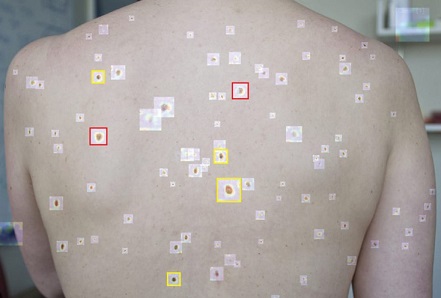AI in Medicine: Use Of Artificial Intelligence Helps Improve Accuracy Of Diagnosis Of Skin Cancer
Nikhil Prasad Fact checked by:Thailand Medical News Team Apr 14, 2024 1 year, 8 months, 15 hours, 53 minutes ago
AI- in Medicine: Artificial intelligence (AI) has been making significant strides in revolutionizing various aspects of medicine. One area where AI shows immense promise is in the diagnosis and treatment of diseases, including skin cancer. Recent research, such as the study conducted by Stanford Medicine, underscores the potential of AI algorithms powered by deep learning to enhance the accuracy of skin cancer diagnoses. This
AI in Medicine news report delves into the intricacies of AI-assisted skin cancer diagnosis, its impact on healthcare practitioners, and the future implications for clinical practice.
 AI in Medicine: Use Of Artificial Intelligence Helps Improve
AI in Medicine: Use Of Artificial Intelligence Helps Improve
Accuracy Of Diagnosis Of Skin Cancer
The Stanford Study: Unveiling AI's Impact on Skin Cancer Diagnosis
The study led by researchers at Stanford Medicine sheds light on how AI can collaborate with healthcare practitioners to improve patient care, particularly in diagnosing skin cancers. Professor Eleni Linos, along with her team, explored the effectiveness of AI algorithms in assisting healthcare practitioners in accurately diagnosing skin conditions.
Understanding AI in Dermatology
AI algorithms utilized in dermatology are trained using vast datasets comprising images of various skin conditions. Through deep learning techniques, these algorithms learn to recognize patterns indicative of specific skin diseases, including cancers. However, it's crucial to note that AI algorithms function alongside clinicians who validate and interpret their suggestions.
Enhanced Diagnostic Accuracy with AI
The findings of the Stanford study revealed a notable improvement in diagnostic accuracy when healthcare practitioners were assisted by AI algorithms. Without AI assistance, practitioners achieved an average sensitivity of 75% in diagnosing skin cancer cases and 81.5% specificity in identifying non-cancerous conditions. However, with AI guidance, sensitivity and specificity increased to 81.1% and 86.1%, respectively. This enhancement in accuracy is particularly beneficial for ensuring correct diagnoses and optimizing patient outcomes.
AI's Impact Across Healthcare Specialties
The study also examined how AI assistance influenced healthcare practitioners across different specialties. While dermatologists and residents exhibited improved diagnostic accuracy with AI, non-dermatologists such as medical students, nurse practitioners, and primary care doctors experienced the most significant enhancement in sensitivity and specificity. This underscores the democratizing effect of AI in healthcare, empowering practitioners at various experience levels to deliver more precise diagnoses.
Exploring Human-AI Interaction
Beyond improving diagnostic accuracy, understanding the dynamics of human-AI interaction is crucial for successful AI integration into clinical practice. Factors such as clinician confidence, AI reliability, and agreement between human and AI diagnoses play pivotal
roles in determining the extent to which practitioners incorporate AI recommendations into their decision-making processes.
Challenges and Future Directions
While AI shows immense potential in enhancing diagnostic capabilities, several challenges must be addressed. These include the need for diverse and high-quality training data, transparency in AI algorithms, and guidelines for reporting AI tool performance. Additionally, further research in real-world clinical settings is essential to validate AI's impact on clinical decision-making and patient outcomes.
Implications for Medical Practice
As AI continues to evolve, its integration into medical specialties like dermatology holds promise for improving patient care, reducing diagnostic errors, and alleviating physician burnout. The key lies in harnessing AI's capabilities while ensuring ethical and responsible use to benefit patients of all backgrounds.
Past research has highlighted the significant impact of various factors on clinicians' decision-making processes when incorporating AI algorithms into clinical practice. These factors include the clinician's level of confidence in their own clinical judgment, the confidence level associated with the AI's recommendations, and the degree of agreement between the clinician and AI regarding the diagnosis.
Specialties such as dermatology and radiology, heavily reliant on imaging techniques like visual inspections, X-rays, MRIs, and CT scans, are particularly conducive to AI assistance. The ability of AI systems to discern intricate details beyond human perceptual capabilities makes them invaluable in such image-centric fields. However, the potential benefits of AI intervention extend beyond imaging-based specialties to encompass symptom-based disciplines and predictive modeling.
The integration of AI technologies not only holds promise for improving diagnostic accuracy and efficiency but also for alleviating physician burnout and fostering stronger doctor-patient relationships. The dual advantage of enhanced accuracy and time-saving capabilities signifies a mutually beneficial scenario for both healthcare providers and patients.
As AI continues to evolve, its eventual integration into all medical specialties appears inevitable. The primary concern lies in ensuring that AI deployment is ethically sound, prioritizing patient well-being irrespective of background while simultaneously supporting the overall well-being of healthcare professionals.
Conclusion: Embracing AI for Enhanced Healthcare
In conclusion, AI's role in medicine, particularly in skin cancer diagnosis, is transformative. The collaboration between AI algorithms and healthcare practitioners has the potential to revolutionize diagnostic accuracy, optimize treatment plans, and ultimately improve patient outcomes. As we navigate the frontier of AI-assisted healthcare, it is imperative to foster interdisciplinary collaboration, ethical AI deployment, and continuous research to unlock AI's full potential in revolutionizing healthcare delivery.
The study findings were published in the peer reviewed journal: npj Digital Medicine.
https://www.nature.com/articles/s41746-024-01031-w
For the latest on
AI in Medicine, keep on logging to Thailand Medical News.
